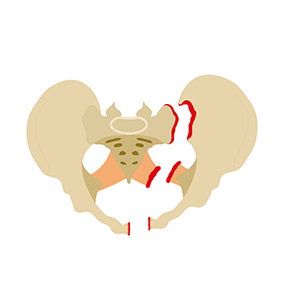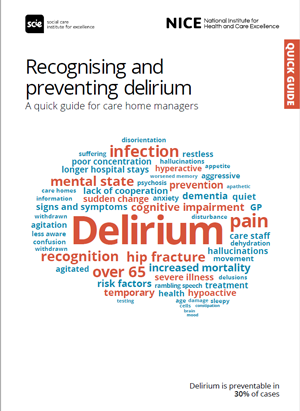A quick guide for care home managers
Think delirium!
Delirium is a sudden change in a person’s mental state. It is a serious condition that is sometimes mistaken for dementia or, more rarely, depression.
Unlike dementia, delirium develops quickly and is usually temporary.
Having delirium can mean:
- longer hospital stays
- increased risk of dementia
- increased mortality.
Treatment will depend on the underlying cause and should be managed by a healthcare professional, such as a GP.
Delirium is preventable in 30% of cases.
Risk factors for delirium

Aged over 65 years.

Cognitive impairment and/or dementia.

Current hip fracture.

Severe illness.
Recognising delirium: signs and symptoms
Hyperactive delirium
Makes a person restless, agitated, aggressive.
Symptoms include:
- Increased confusion
- Hallucinations or delusions
- Sleep disturbance
- Being less co-operative.
Mixed delirium occurs when the person moves between the two types.
Hypoactive delirium
Makes a person withdrawn, quiet, sleepy.
Symptoms include:
- Poor concentration
- Being less aware
- Reduced mobility or movement
- Reduced appetite.
The severity of symptoms can vary during the course of a day.
If any of these changes occur, an assessment from a health or social care practitioner should be requested. If the assessment indicates delirium, a healthcare professional with the relevant expertise should make the final diagnosis.
Preventing delirium
General principles
To help prevent delirium in anyone at risk:

Make sure support is provided by carers who are familiar to them.

Avoid moving the person unnecessarily, and keep their surroundings familiar.

Request a review if they are taking multiple medications.

Check on admission, and then daily, for any changes that might indicate delirium and refer for an assessment if needed.
Assess and plan
Factors that make delirium more likely are listed below, with steps to help reduce the risk.
Cognitive impairment or disorientation
- Make sure the person can see a clock and a calendar.
- Talk to the person to help orientate them.
- Make sure any hearing aids and glasses are being worn
and work well.
Limited mobility
- Encourage the person to walk.
- Provide support to do a range of active exercises, even if walking isn’t possible.
Dehydration or constipation
- Encourage the person to drink.
- Support the person to avoid or address constipation.
Pain
- Look for signs of pain, particularly if the person has a learning disability or dementia (Abbey Pain Scale is a tool that might help with this).
- Make sure pain is well-managed.
Infection
- Look for signs of infection.
- Avoid using a catheter as far as possible.
Poor food intake
- Make sure any dentures are clean, being worn and fit well.
- Look at the advice in our ‘Nutrition support in adults’ guideline (NICE guideline 32).
Disturbed sleep
- Avoid disturbing the person during sleep periods.
Sharing information
Being well-informed may help reduce any distress for the person and their family.
Care staff should provide information that shows:
- where to find support
- the importance of telling care staff about any sudden changes
- delirium is a common condition that is usually temporary
- how other people with delirium have felt.
The public delirium information leaflet from the Royal College of Psychiatrists may be helpful.
Experiences of people with delirium
- Worrying that people are trying to harm you.
- Feeling afraid, irritable, anxious, depressed.
- Having vivid dreams that continue when awake.
- Difficulty following what is being said.
- Difficulty speaking clearly.
- Seeing and hearing things that are not there.
Adapted from Dementia UK.

Further information
- NICE guideline, including assessment and care plan templates in tools and resources: Delirium: prevention, diagnosis and management
- NICE quality standard: Delirium in adults
- Royal College of Psychiatrists: Public delirium information leaflet
- Dr Sophia Bennett and Dr Mani Krishnan, part of the #ICanPrevent delirium conversation: Delirium awareness video (YouTube)
- Alzheimer's Society: Delirium
- Dementia UK: Delirium (confusion)
- Healthcare Improvement Scotland: Delirium toolkit

Download this guide
We've created a copy of this guide that you can print and share:
This content has been co-produced by NICE and the Social Care Institute for Excellence (SCIE). It is based on NICE’s guideline on recognising and preventing delirium.
